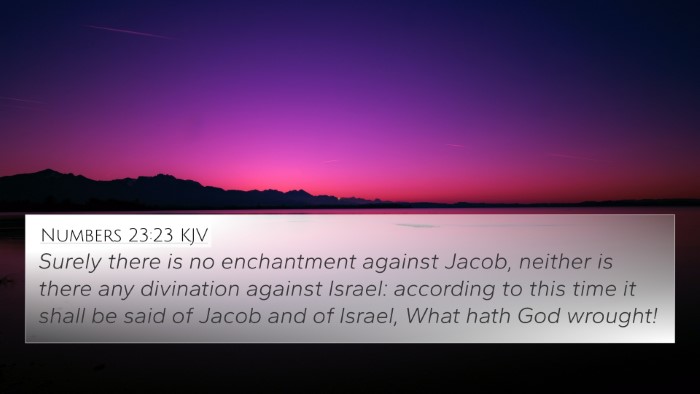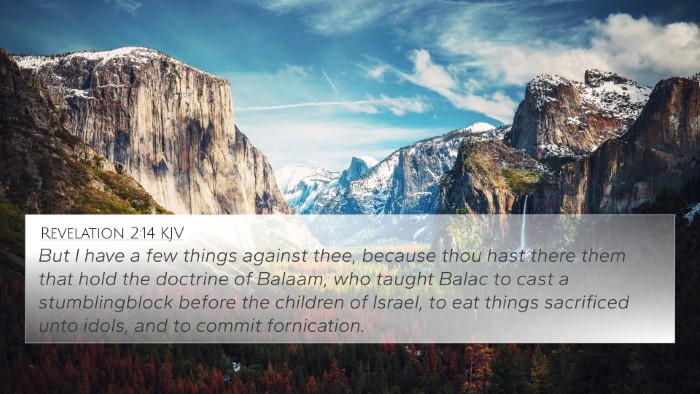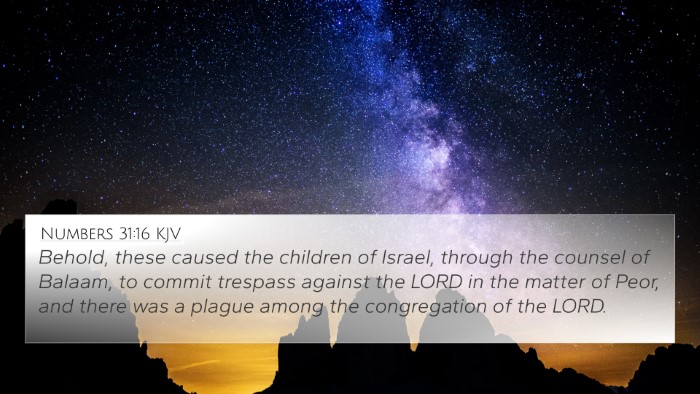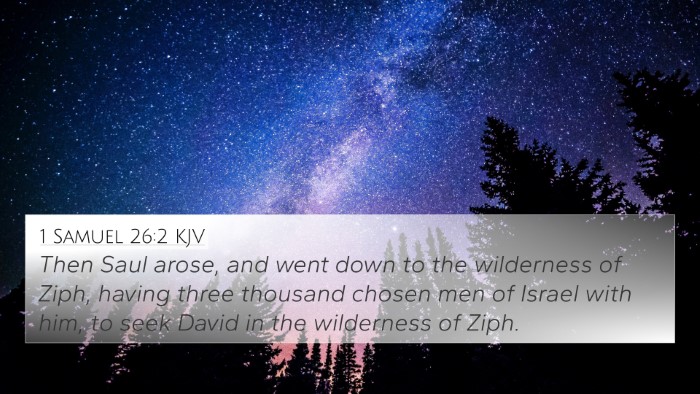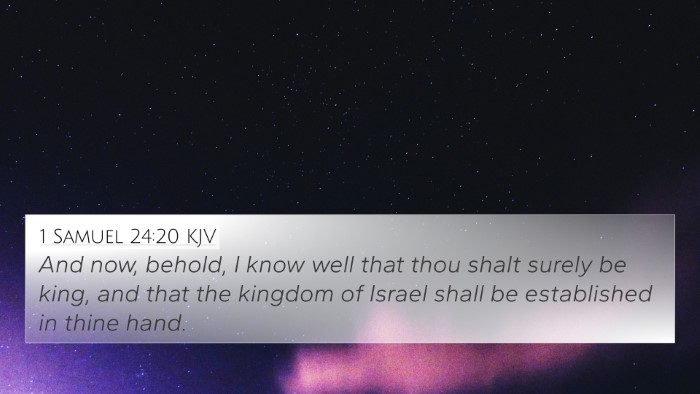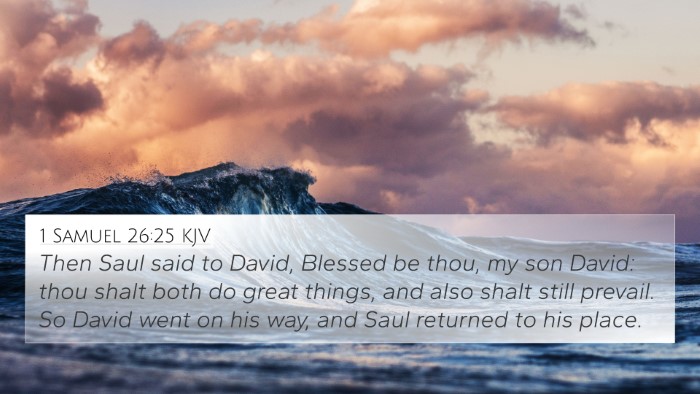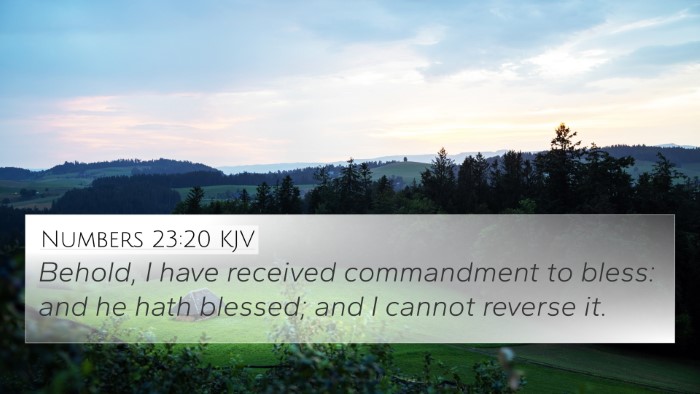Understanding Numbers 24:1
Numbers 24:1 states: “And when Balaam saw that it pleased the Lord to bless Israel, he went not, as at other times, to seek for enchantments, but he set his face toward the wilderness.” This verse carries profound implications about divine favor, the nature of true prophecy, and the importance of seeking God's will above human desires.
Spiritual Context and Significance
This passage occurs during Balaam's interaction with Balak, the king of Moab, who hired Balaam to curse the Israelites. However, Balaam's experience reflects a critical transformation upon understanding that it is God alone who directs blessings and curses. Public domain commentaries illuminate various aspects of this transformation:
-
Matthew Henry's Commentary: Henry emphasizes that Balaam's change in approach demonstrates a moment of clarity, recognizing it pleased the Lord to bless Israel, indicating divine sovereignty. This change from seeking enchantments signifies that true prophecy cannot be manipulated; it must align with God's will, which aligns with God's overarching covenant promises to Israel.
-
Albert Barnes' Notes: Barnes highlights the importance of Balaam's decision not to pursue enchantments this time, signifying a shift from conventional maritime sorcery to divine revelation. He notes that Balaam’s efforts to manipulate blessings through magic were futile in light of God's intentions, showcasing God’s dominion over all earthly rulers and magicians.
-
Adam Clarke's Commentary: Clarke elaborates that Balaam's realization to not seek enchantments is a pivotal lesson in dependence on God’s voice versus man’s means. Balaam's gaze “toward the wilderness” symbolizes a spiritual alignment and focus on God’s creation rather than human systems of power and influence. This suggests a redirection to genuine spirituality, as opposed to superficial practices.
Connections with Other Bible Verses
To enhance the understanding of Numbers 24:1, it is crucial to explore related scripture and their thematic connections. Below are several Bible verses that highlight the connections and themes found in this passage:
- Deuteronomy 23:5: “Nevertheless, the Lord thy God would not hearken unto Balaam; but the Lord thy God turned the curse into a blessing unto thee because the Lord thy God loved thee.” This verse emphasizes God’s power to change curses into blessings, reinforcing the message in Numbers 24:1.
- 1 Samuel 15:29: “And also the Strength of Israel will not lie nor repent: for he is not a man, that he should repent.” This affirms God's unchanging nature and His sovereign control over blessings and judgments.
- Psalm 33:10-11: “The Lord bringeth the counsel of the heathen to nought: he maketh the devices of the people of none effect. The counsel of the Lord standeth for ever, the thoughts of his heart to all generations.” This verse resonates with the impotence of enchantments against God’s will.
- Jeremiah 29:11: “For I know the thoughts that I think toward you, saith the Lord, thoughts of peace, and not of evil, to give you an expected end.” This showcases God’s good intentions towards His people, emphasizing His favor towards Israel.
- Isaiah 54:17: “No weapon that is formed against thee shall prosper; and every tongue that shall rise against thee in judgment thou shalt condemn. This is the heritage of the servants of the Lord, and their righteousness is of me, saith the Lord.” This reiterates that human schemes to harm God’s chosen are ultimately futile.
- Galatians 3:13-14: “Christ hath redeemed us from the curse of the law, being made a curse for us: for it is written, Cursed is every one that hangeth on a tree: That the blessing of Abraham might come on the Gentiles through Jesus Christ; that we might receive the promise of the Spirit through faith.” This New Testament perspective links the Old Testament themes of blessing and cursing through Christ.
- Revelation 22:17: “And the Spirit and the bride say, Come. And let him that heareth say, Come. And let him that is athirst come. And whosoever will, let him take the water of life freely.” This invitation signifies that God's blessings are extended not only to Israel but also to all who seek Him, indicating the broader implications of God's grace.
Thematic Connections and Implications
Through comparative analysis, key themes emerge from Numbers 24:1:
- Divine Sovereignty: A recurring theme is God’s ultimate control over blessings and the futility of human attempts to alter divine plans.
- The Role of Prophecy: Balaam's transition from enchantments to divine favor raises questions about the legitimacy of prophetic voices and their alignment with God’s will.
- Faith versus Magic: The contrast between seeking human magical practices versus reliance on God marks a pivotal spiritual journey portrayed in this scripture.
- The Nature of Blessing: Blessings from God stand in stark opposition to human machinations, illustrating the security of God’s promises to His people.
Conclusion
In summary, Numbers 24:1 presents profound theological insights into the nature of divine favor, the integrity of prophecy, and the importance of seeking God's will above human desires. By exploring the interconnections with other Scripture and understanding Jesus' fulfillment of blessings through the New Testament, we can cherish a holistic view of God's relationship with His people, bridging the Old and New Testaments. Fostering an understanding of these thematic Biblical connections enhances our spiritual insights and brings clarity to our relationship with God.
For those seeking deeper insights, employing a Bible cross-reference system can illuminate further connections across scriptures, allowing for rich comparative Bible verse analysis. Tools for Bible cross-referencing, such as concordances and cross-reference guides, can significantly aid in uncovering the depths of these connections. The links between the Prophets, Apostolic teachings, and the overarching doctrines presented in Scripture create a cohesive narrative centered on God's faithfulness and love towards humanity.




